Practicing Chinese as a Camp Counselor
This is an interview with Nick Lenczewski, who served as a camp counselor at Concordia Village this summer. Although Nick is already a practicing interpreter in Minnesota, he doesn’t have many opportunities to practice Chinese in a fun environment, or to share in the enjoyment of the endeavor. In the interview below, I ask Nick for some details on what exactly he did, and what he got out of it.
John: Could you explain what the Concordia Language Village is? Who is it for?
Nick: The goal of Concordia Language Villages is to create global citizens. They do this through immersion language camps in many languages including Mandarin, Japanese, German, Swedish, Arabic, French, Spanish, Russian, Italian, and more. Programs are available to kids ages 2-18 and adults ages 18 and up. During the summer there are 4-week, 2-week, and 1-week long sessions. There are also weekend programs available for adults and kids during the academic year. The language villages are located in northern Minnesota, USA at different sites around Bemidji, Minnesota.
Students have a schedule which consists of classes in their target language, meals, activities like swimming, biking, or other cultural activities such as mahjong for the Mandarin camp. Everything is done in the target language and students are surrounded by several dozen counselors speaking the language to them throughout the day during their classes, at meal times, and in between. Every night there is an evening activity which is usually a game of some kind that involves speaking the language and usually learning the culture of the language. Each night there is a campfire. There is lots of singing done throughout the day every day.
John: What do you mean by “create global citizens?”
Nick: A global citizen is someone who is fluent in more than one language and understands and appreciates cultural diversity. A global citizen should express empathy for their neighbors in the village and be globally minded.
John: What was your role at the Concordia Language Village this summer?
Nick: I worked as a counselor at the Mandarin camp, which is called 森林湖 (Senlin Hu). (All language camps are called “forest lake” in their target language.) My main duties were working as a small group Mandarin teacher and as an activity teacher. Most of the 40 counselors had the same duties. I taught a class of 6-8 students ages 6 to 14 for my first two weeks at the camp. Their Mandarin level was the lowest of all groups and I usually had at least a few students with no Mandarin background. The students were there for one week each. After this I taught a mahjong activity class. For this class I taught it with another teacher since there were fewer students last two weeks of camp than the first two weeks. We had 8 students each time we held the activity class. I think it ended up being one of the most popular activity classes. The kids really liked mahjong. All of these classes were taught in Mandarin, though with the students with no language background I did speak some English with them some of the time.
Besides my duties as a teacher I slept in the same cabin along with three other counselors with students, and sat at a table (AKA 家) with students during their meals. Some of the activities are done during the camp are done as a cabin and some are done as a 家. In these instances I would be in charge of this group of students. Activities could include putting on a play, playing some games in a competition with other 家, or cleaning the 大楼 (building) toilets. In addition to the duties of a normal camp counselor, my job was to speak Mandarin with them.
John: Do you think the summer program is true immersion? What are the pros and cons?
Nick: Although we speak mostly in Mandarin with students, there are times when it is permissible to speak English. These times include anything involving safety announcements. In the evenings before bed each cabin has a meeting or 木屋会 (muwu hui), where everyone shares their highs and lows of the day. If it is too difficult to express something in Mandarin it is okay to speak in English. Besides speaking in Mandarin, the goal of the 木屋会 is to share what has been troubling you and what has been going well for you and not necessarily to practice Mandarin. This is done mainly to help students emotionally.
If immersion is having Mandarin spoken 100% of the time, then the camps would not be considered true immersion. At the same time, for Mandarin learners I think it is an awesome opportunity learn Mandarin. Some of these students had no Mandarin background before coming to the camp and within 4 weeks were speaking passable Mandarin. They were better than some of the foreign English teachers in China I knew who’d been studying for months.
In some ways I think total immersion like in China might not be as good as having an 90% immersion environment like this at Concordia when first beginning to learn Mandarin. It can be daunting to be in a true immersion environment and try to figure out a new language with no English assistance. However, at Concordia Language Villages English is used sometimes in order to help students learn.
A con of this system is having really little kids in the camp (below age 10). Simply by being at camp and away from home camp can be an emotionally challenging experience for many students (I myself was extremely homesick the first time I went to camp when I was 11). Learning a language on top of this is extremely difficult, definitely not the ideal state of mind for language learning. If you are not mentally calm it is very hard to learn a new language.
John: What are the pros and cons of being a counselor?
Nick: The biggest pro of being a counselor was meeting all of the other counselors. They were super cool, from all over the US, China, and world, and loved Mandarin, music, travel, and people. Bonding with them through classes, orientation, and the little free time we had, was easily the best part about the camp in my opinion. The friendships made with some of the students was also great.
Being a camp counselor is also a good opportunity to improve your own Mandarin. Many of the counselors I met had never been to China or only once for a short amount of time, but they still had great Mandarin. I think they owe this in part to being a counselor at camp over the years. Many of them had been a counselor for multiple years. I’m also an author and for me this was a great opportunity to promote my book.
A major con is that the pay being quite low. Even with room and board it is still pretty low, just over $1,000 for 4 weeks. Another con is that there is almost no free time. From the time students wake up at 8 am to the time the go to sleep (somewhere between 10 and 11 pm, typically), you always need to be on and ready to help in some way. This includes Saturday and Sunday as well since we also had activities and things for students to do on these days.
John: Describe the kids that are there. Why are they there, and what do their attitudes tend to be?
Nick: The students came mostly from all over the US but there were also students from UK, Singapore, Japan, and I imagine other countries as well. These students had all different levels of motivation. Some had great Mandarin and others didn’t know anything. Some students were eager to learn Mandarin while others were there more for the camp experience regardless of the language immersion aspect. I expect some students were there because their parents wanted them there, while others were there because they wanted to be. Many students had been to the camp multiple times, some at least 5 times.
One activity we did every day was called 中国通 (Zhongguo Tong) where students were given a special name tag and had to speak only in Mandarin the entire day. If a counselor heard them speaking English, they would take it away and thus they would not receive a 中国通 bead for that day (the beads are a way of rewarding students). Those students who really wanted to be at camp were able to get a dozen or more of these beads over the four weeks they were there by speaking lots of Mandarin and no English, while those who weren’t as keen on speaking Mandarin at camp were only able to get a few. They did this not by speaking Mandarin, but by not speaking any English and speaking a little Mandarin.
John: Can you share a story or two about special “learning moments” you witnessed or were part of?
Nick: During my time as a counselor I was placed in a cabin with the male students, ages 13-16 who were with the camp for 4 weeks. Two of these students had never learned Mandarin before so I was curious to see how much they would be able to learn in 4 weeks. Each night during our 木屋会 everyone shared one high and one low from the day. In the beginning these two students needed to speak in English since they had no Mandarin abilities. But by the end of the second week they were able to tell us their highs and lows. Highs often consisted of having a good meal, making a new friend, or finishing a test. Lows included the hot, humid weather, the mosquitos, or their homework load. I was amazed at how quickly they progressed in just a few weeks.
One evening activity we did was called 三国 (“three kingdoms”). Students formed three separate countries with their own special cultural taboos, greetings, languages, and exchange rituals. The object of the activity was to send out people to a different country to collect their sacred item (pool noodle, badminton racket, basketball). But in order to collect the item, one needed to figure out the culture of the other group by successfully greeting them, blending in with their culture, and completing their ritual of exchange, all without messing up. There was therefore a lot of trial and error. One group’s culture revolved around dancing, another around being anti-social, and the third around worshiping a burping deity.
At the end of the activity at our evening campfire we talked about what it was like for the students. We also spoke in English since we wanted everyone to be able to freely discuss what happened. Based on the amount of student engagement this was the most successful evening activity we did in the 4 weeks I was at camp. As counselors we asked students what it felt like to try to understand a new culture, we asked them to consider the biases they had about a culture before interacting with them. One student said it was hard to blend in with one culture because they did not accept people who smiled and she smiled a lot. Another said it was difficult to blend in with the dancing culture because he couldn’t dance well.
Some students talked about the prejudices that they had towards each other at the beginning of camp but that they were able to overcome differences and become friends. The experience taught everyone about how to be accepting of others, not only those of other cultures, but also those within the same city or state.
John: So what is your takeaway from the experience? Do you recommend becoming a Chinese camp counselor to others?
Nick: If you are looking to improve your Mandarin I think being a counselor at the language village is a good opportunity. For someone like me who has been studying Mandarin for 9 years and has worked as a translator and interpreter for several years in China and USA, it was not necessarily as big of a help. I didn’t make that much of an effort to improve my vocabulary by using new words in conversation with other counselors, but I did learn a few dozen words passively, mostly words like 篝火 (camp fire), 防蚊液 (mosquito repellant), and 防晒霜 (sunscreen).
For me, as a counselor, the real value of Concordia Language Villages was meeting the other counselors, all of whom all love languages, traveling, music, performing, or living abroad. In addition to bonding with the other Mandarin counselors, there was a week-long orientation at the beginning of the summer camp where counselors of all language camps were able to meet and prepare for camp. Meeting all the people from other camps (Italians, Russians, Japanese, Spanish), listening to their music, and trying to connect with them made me want to learn their languages, experience their cultures, and see their countries. In my opinion, learning a language is not a goal, and instead a means. The goal is to connect with and understand another person; the language is the means to do this. Learning their language shows you care about them, and caring about someone is the building block for having a good interaction with them. Life is all about love and there is a whole lot of it at Concordia Language Villages.
This interview was not intended to be an ad or direct endorsement for Concordia Language Villages, but I had heard of the immersion camps at Middlebury, and I had no idea there were others in places like Minnesota. Then when I met Nick and discovered he was going to be a counselor at one, I jumped on the opportunity to learn more about them.
If you have questions for Nick, please leave a comment on Sinosplice or get in touch with him through his website.

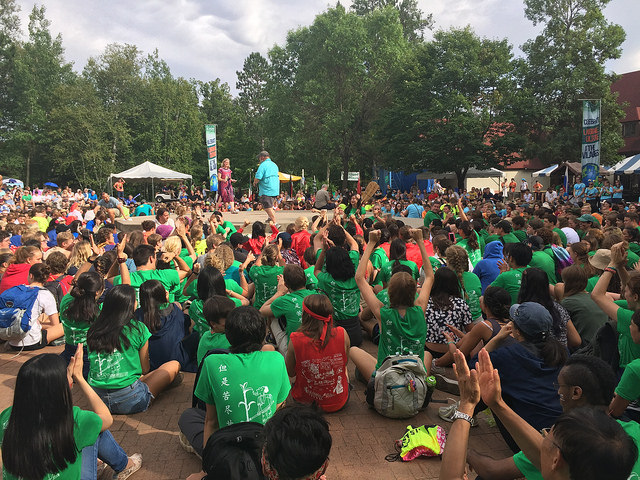
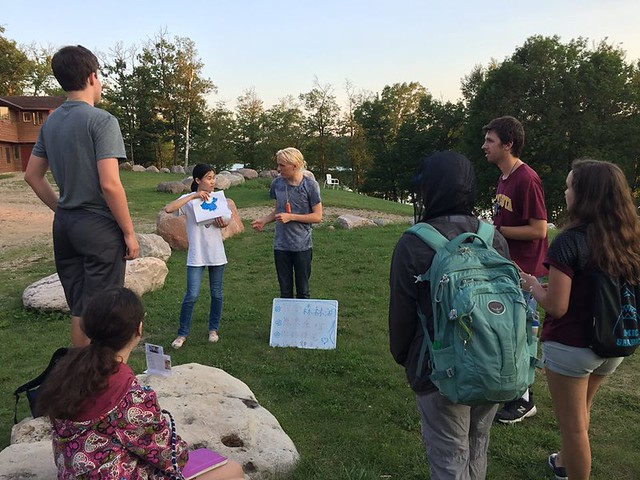
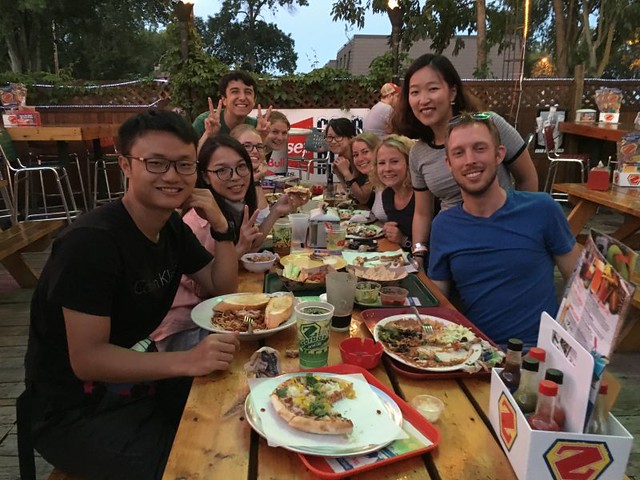
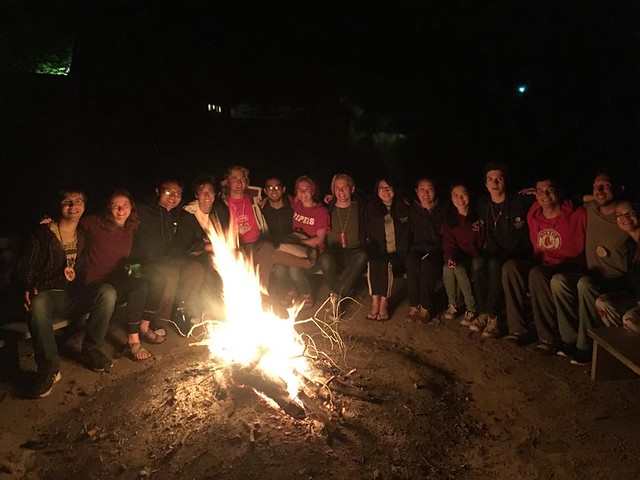
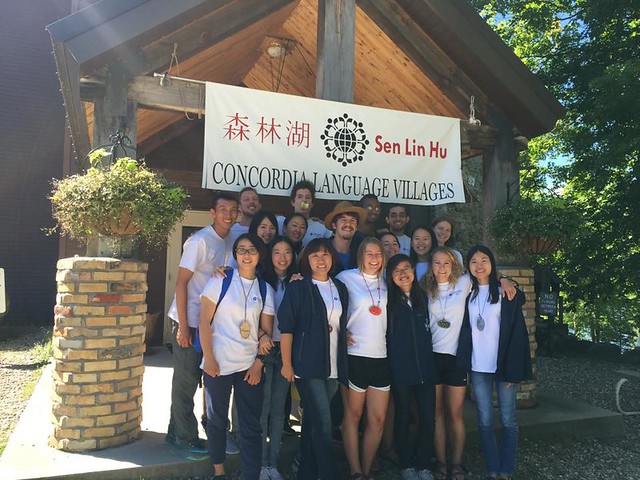
Cool interview. The summer language trip to Xi’an I did back in 1994 was run by Concordia. Quite a few of the other students had previously attended to the Minnesota camp and traded in-jokes about Senlinhu. For actual immersion (for those who desire it), the confines of the camp sounds like a better environment than an overseas trip, where it would have been impossible for our sole adult leader to enforce a Mandarin-only program. It was a great experience overall, but outside formal classes and directed excursions, we were mostly left to our own devices. I recall lots of shopping and biking around the city early on, but in later weeks we tended to just hang out in someone’s guest house room to watch epic Magic the Gathering sessions.